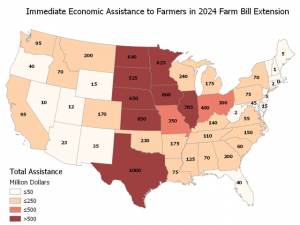
Producers will stop receiving payments when they run up against the life-of-farm bill payment limits on several price support programs.
Congress’ inability to pass a new farm bill before the end of the current fiscal year on Sept. 30 could have an impact on more areas of farm programs than just the low reference prices in the current law.
Producers will stop receiving payments when they run up against the life-of-farm bill payment limits on the Conservation Stewardship, Environmental Quality Incentives and other popular conservation and price support programs in the new fiscal year.
“There was supposed to be a farm bill in 2012, and we wound up with a 2014 farm bill,” said a farm bill analyst interviewed in mid-September. “In practice, this extended the farm bill by two years without increasing the overall payment limits. The current farm bill authorization process may stretch what was designed to be a five-year limit to eight years.
“When you have discussions about continuing resolutions for either funding the government or the farm bill in general, there are some major issues that are not addressed there. And these are issues that Mississippi and Arkansas farmers are well aware of because they do such a great job leveraging farm bill programs. And that is ‘life of farm bill’ conservation program payment limitations.
Advocating for stewardship
That is a real concern for people making a living in agriculture and “trying to do the right thing on their farms,” said Trey Cooke, executive director of Rural Investment to Protect Our Environment. RIPE has been advocating for conservation payments that more closely align with the costs of stewardship practices.
He cited the Conservation Stewardship Program, which has become one of the fastest growing conservation programs in the U.S. CSP has a $40,000 per year per person payment limit and a $200,000 life-of-farm-bill limit. Similarly, there’s a $450,000 payment limit for the farm bill for the Environmental Quality Incentives Program or EQIP.
“It’s not just conservation programs – other farm programs authorized by the farm bill have limits and many of those are dictated by the farm bill period,” he said. “Farmers that are building capacity to scale their conservation interests may find themselves in a position to not be able to compete for new funds because they met the payment limitation and cannot renew because the farm bill has not been renewed.”
The flip side of the equation is that farmers who have not participated in those conservation programs because of lack of funding may now be able to do so.
“An extension may provide some opportunity to get into a program because when people are capping out a new entry point is created for other producers to participate,” said Cooke. “It is good for new farmers to be able to participate, but policy makers need to realize that many of the conservation gains made by early adopters and prior program participants may be lost if incentives are not maintained without interruption.”
As this is being written, Congress had six days to pass legislation funding the government and preventing a shutdown at midnight on Sept. 30. While some members have talked about trying to pass some version of a farm bill in that time, the more likely scenario seems to be addressing the farm bill after the Nov. 5 elections, during a lame duck session or in the spring of 2025.
Farm bill extension
Extending the current farm bill into the new fiscal year on Oct. 1 is a possibility but doesn’t seem to be a priority because most of the farm bill commodity title program will remain in effect until the end of the 2024 crop year on Dec. 31.
Cooke, who spent most of the summer traveling and meeting with farmers and their organizations to find how RIPE might be able to advance cost-effective conservation payments, said he believes the farm bill path depends on the outcome of the elections.
Several significant policy and political challenges appear to be drivers of this extended farm bill debate, according to other farm bill observers. In August, the Congressional Budget Office and the House Agriculture Committee-passed farm bill would increase the federal deficit by $33 billion, which puts a cloud over what was assumed to be a final product.
“Most analysts now believe the House Ag Committee will have to revisit its bill to bring it into line with the CBO’s recommendations,” said one. “Furthermore, there is still no floor vote for the farm bill scheduled in the House of Representatives this year.”
As for the Senate, rhetoric remains positive although little movement has been noted since the release of the Senate majority’s farm bill framework on May 1. This is despite the fact that Sen. Debbie Stabenow, D-Mich., chairman of the Senate Committee on Agriculture, Nutrition and Forestry, is retiring and has little time left to finalize a Senate farm bill under her leadership.
In addition to House and Senate dynamics, the election itself has put a cloud over the future of the farm bill as party politics drive a game of “what if.”
If Republicans gain control of the Senate in November, how likely are they and House Republicans to work with Stabenow and Senate Democrats to pass a farm bill in the lame duck session? What happens if no bill is passed by the end of December, and Democrats have to reorganize on the Senate side in January. What if Democrats gain the majority in the House and control of the House Ag Committee?
You can now read the most important #news on #eDairyNews #Whatsapp channels!!!
🇺🇸 eDairy News INGLÊS: https://whatsapp.com/channel/0029VaKsjzGDTkJyIN6hcP1K























